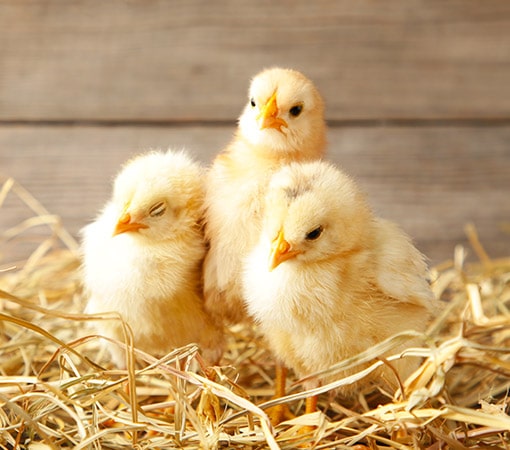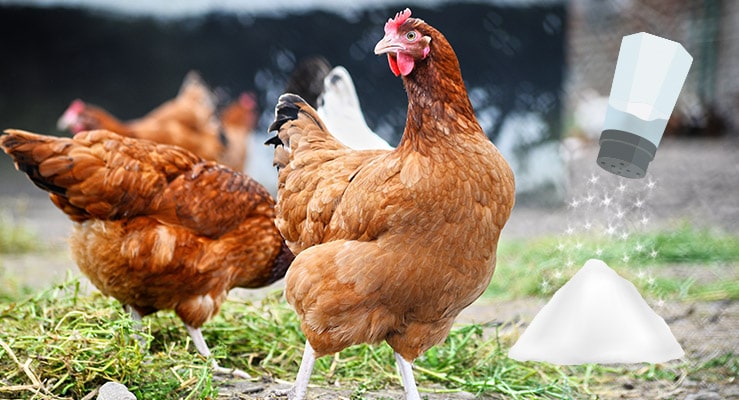Is salt good for chickens and should you include this mineral in their diet? Read the full article to find out the benefits and risks of salt in poultry nutrition.
The diet of poultry must be as balanced as possible. Both the quantity and quality of food decisively influence the way in which your chickens grow and develop. Yet, one thing that many may neglect when considering the nutrition of chickens is salt.
First, let's learn a few things about salt and its role.
What Is Table Salt?
Before determining if salt is beneficial or its consumption poses a health risk for poultry, we first need to know what salt is and its role in a living body.
Salt is indispensable for our lives, and saltiness is one of the fundamental human tastes. Just like humans, most species of animals have an innate need for salt to maintain a proper level of sodium, an electrolyte that controls the amount of water in the body and which also has a role in muscle contractions and nerve impulses.
At its core, table salt is a mineral with the chemical formula NaCl, composed of two combined elements, sodium (Na) and chloride (Cl).
While small amounts of salt are beneficial for humans and animals, a diet that includes too much salt can lead to various health conditions, such as high blood pressure, calcium losses, various heart diseases, and even stroke.
Should Chickens Be Allowed to Eat Salt?
In short, yes, the chickens' diet should include salt to ensure healthy growth. The next big question is "how much?"
Sodium, which is a composite of salt, is typically added to a chicken feed that someone can purchase at the farm store. Now, the exact quantity may vary from one producer to another, but on average, roughly 0.15% is added to the feed.
Many farmers are used to serving food scraps to chickens. Chicks generally love these, but it is recommended to avoid feeding chickens with very salty food leftovers.
A diet that includes an excessive amount of salt will become toxic to poultry and may even turn deadly if it is maintained for an extended period of time.
Why Do Chickens Need Salt?
It is important that chickens have enough salt in their diets for multiple reasons. Firstly, when chickens are small and don't have a balanced salt level in their food, they will always seem tired and drained of energy.
Secondly, salt can also increase their appetites. Therefore, they will eat more and grow faster.
It is important that salt be included in the diet of chickens from an early age. Chicks that are deprived of salt early on will most likely never fully recover.
Although poultry food concentrates normally include the optimal amount of salt, it is recommended that you read the label to make sure. If you feed your chickens with homemade feed, you should add a small amount of salt to it (in proportions of roughly 0.4-0.6%).
When is Salt Bad For a Chicken?
Just as salt can yield great benefits in the development of chickens and in their overall health, a menu that includes too much salt can produce very harmful effects upon the health of these birds. Young chicks that have recently hatched possess more of a risk than older ones.

When this occurs in adult hens that have begun to lay eggs, you may start to notice anomalies of the eggs such as deformations of the shells or a rise in shell-less eggs.
If you witness some of the symptoms mentioned previously in your chickens, but you are pretty sure you are not feeding your animals too much salt, you may need to test your water source. Well water sources can naturally have high salinity levels.
Common Reasons For Salt Deficiency In Chickens
There are a few reasons why a salt deficiency could occur in any chickens.
Most commonly salt deficiency occurs when you feed your chickens exclusively with homemade feed, without adding salt to the composition. This will not only limit the growth potential of the chicken but feeding on fodder that does not contain the vitamins, minerals, and other nutrients needed for the animal to develop can also lead to various diseases.
A second reason is when you buy low-quality poultry food that does not include salt. There are products that don't add salt at all, but there are also cases when salt is listed amongst the ingredients but has just settled to the bottom of the feed bag.
Also, if the salt utilized contains large granules, this may make it harder for it to blend up with the feed. While the correct amount of salt may have been added to the package, it may not have been mixed well enough. This may lead to portions of the bag holding more salt than others and some birds may receive more salt than others.
Another possible situation when sodium deficiency can occur is when birds are raised entirely indoors.
Chickens are omnivorous, which means they can eat both plants and meat. When they have access to an outside yard, they naturally consume earthworms, snails, bugs, and other tiny insects. Earthworms, as well as other critters, contain small amounts of sodium and their consumption may be beneficial for poultry.
Both salts underfeeding and overfeeding are not healthful for a chicken. While raised levels of sodium can be exceedingly toxic for birds, a very low amount of it would result in growth issues.
How To Avoid Salt Problems in Chickens
There are several things you can do to avoid salt insufficiency or intoxication in your chick's diet:
- Feed your birds from a young age only with quality forage.
- Always read the label of chicken feed products and look whether they include sodium or salt in the package.
- Mix the contents of the feed bag to make sure salt has not settled to the bottom of the package.
- Do not give your chickens table scraps that have high salt content, such as lunch meats, salted popcorn, bacon, ham, or other cured meats.
- If you supply water to chicks from a well, test its salinity level at a specialized lab.
Conclusion
Salt can be both good but also bad for chickens, depending on how much is added to their diet.
Poultry needs salt in their foods in order to be healthy. If they are not provided with enough salt, they will not develop as fast and as big as possible and may experience various health conditions. On the other hand, a diet that's too rich in salt can lead to intoxications and other health problems.
Always make sure to use a high-quality feed that has adequate salt levels to provide your chickens' balanced levels of sodium.

